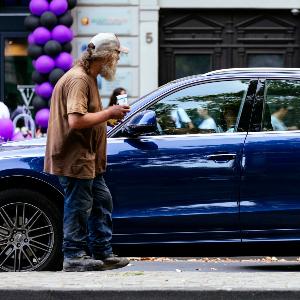“Wealth inequality is growing”
16 Aug 2022
An interview with economist Andreas Peichl about the consequences of the war in Ukraine and the coronavirus pandemic; about aid packages and the value of education.
16 Aug 2022
An interview with economist Andreas Peichl about the consequences of the war in Ukraine and the coronavirus pandemic; about aid packages and the value of education.
Professor Andreas Peichl is Chair of Macroeconomics and Public Finance in the Department of Economics at LMU and Director of the ifo Center for Macroeconomics and Surveys. In our interview, he explains the current situation regarding income and wealth inequality in Germany.
According to reports, the lines in front of food banks are getting longer. Is Germany developing a poverty problem due to the coronavirus crisis and the war in Ukraine?
Andreas Peichl: We scientists are also hearing such anecdotal evidence, as we call it. But in terms of the data situation, it’s still too early to say anything definitive. Unfortunately, we’re way behind the curve in Germany when it comes to genuinely comprehensive, reliable data – in fact, we’re currently at 2018.
As a result of the pandemic, and now too due to inflation and the rise in energy prices, there are of course distortions. Some people are very strongly impacted by these things, while others are winners.Andreas Peichl

Seen on Hohenzollernring, Cologne. | © Foto: Geisler-Fotopress/Hardt
Is there nothing at all we can say about whether the crises are increasing income inequality?
Well, we do have some information. There are surveys such as the Socio-Economic Panel carried out by the German Institute for Economic Research. And as a result of the pandemic, and now too due to inflation and the rise in energy prices, there are of course distortions. Some people are very strongly impacted by these things, while others are winners. You see, the money doesn’t just disappear. Ultimately, it’s redistributed in one form or another. And this leads to changes in income distribution.
Studies came out during the pandemic which claimed that income inequality had decreased. That’s not necessarily what one would have expected. Is it actually the case?
During the pandemic, the crisis strongly impacted many self-employed people, who earn somewhat more on average than employees. This reduced income inequality to some degree. Moreover, government measures such as the children’s bonus were effective primarily at the lower end of the income distribution. Overall, therefore, income inequality did in fact fall in 2020. This situation probably reversed somewhat in 2021, because there were a lot of restrictions, particularly in the food service industry. And the people who work in that sector tend to be lower earners.
In terms of wealth, we do have relatively high inequality in Germany, at least when we consider real estate ownership and investments.Andreas Peichl
For some time now, the sentiment “The poor get poorer; the rich get richer” chimes with many people. Is there any evidence for it being true?
In terms of wealth, we do have relatively high inequality in Germany, at least when we consider real estate ownership and investments. Less than half of Germans are property owners. But if you have one property, that pretty much automatically puts you in the upper half of wealth distribution. Meanwhile, only about a quarter of Germans participate at all in the stock market. But because real estate and stocks experience the highest appreciation, this means that wealth inequality remains comparatively large and tends to increase. We saw this recently with the coronavirus: At the beginning, stock prices fell, but then they bounced back to record levels. The onset of the war in Ukraine also made a dent in the stock markets. But in the medium term, prices will recover again, with the result that wealth inequality will tend not to decrease, but to become greater.
And what’s the situation for income?
Things are a bit different there. Over the past ten years, we have seen that people on lower incomes have caught up, including as regards real earnings – that is to say, once inflation has been subtracted. This is related to the introduction of the minimum wage and to its recent increase.
The poorest 10 to 20 percent of the population, on the other hand, do not have any buffer. They have to cut back on consumption.Andreas Peichl
But doesn’t the comparatively high inflation at the moment particularly affect low earners?
There are two areas in particular that are getting more expensive: food and energy. And food makes up a bigger share of the overall consumption of low earners than it does for high earners, meaning that price rises are hitting low earners harder. In the case of energy costs, it is higher income brackets that consume more energy. To drive an SUV, you have to be able to afford one. Among the poorest 20 percent of the population, by contrast, there are many people who do not own a car at all. Moreover, a large house consumes more energy than a two-bedroom apartment. So it is richer people who are somewhat more strongly affected by higher energy costs, albeit they can afford the higher costs. They do not have to reduce consumption when energy prices are rising as now. The poorest 10 to 20 percent of the population, on the other hand, do not have any buffer. They have to cut back on consumption.
The energy allowance would be much better if it was just paid out to the poorest 20, 30, or 40 percent.Andreas Peichl

Prof. Dr. Andreas Peichl | © LMU
There have been various aid packages. Are there any economic conclusions we can draw yet?
For definitive conclusions, it’s still too early, as many of the measures are only just getting going. What we can say is that some of the actions undertaken do not make much sense. This includes the fuel tax rebate. If you’ll remember, the actual goal was to reduce consumption in order to save energy. And also with regard to climate change, it would be good to bring down energy consumption. Therefore, it would be better if prices went up, so that people reduced their consumption. And that targeted support was provided to those who would then struggle to afford fuel. In this light, we see the merit of things like the energy allowance. And yet this is not without its problems either, as it’s allocated through the income tax system. This means that even someone who earns a million euros gets something from the allowance. Admittedly, such a person receives only half the full amount, because they pay the top rate of tax of almost 50 percent. But somebody earning a million a year doesn’t need this money at all. The energy allowance would be much better if it was just paid out to the poorest 20, 30, or 40 percent.
But direct payments are not so easy, are they?
That is a fundamental problem. In Germany, there is no mechanism in existence yet for paying out money directly to every single citizen.
Education is the best medicine for inequality of any kind.Andreas Peichl
What would have to happen to reduce inequality in income and wealth?
As regards the long term: Education is the best medicine for inequality of any kind. And we continue to have big problems here in Germany, above all in the area of early childhood learning, which often involves basic childcare at best. Putting it crudely, making sure that the child survives the day without hurting itself or others. Other countries are a good distance ahead of us in this regard. Free, high-quality early childhood education should also be available for all in Germany.